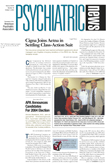The city of Boston hosts a couple of gems that art- and museum-loving psychiatrists attending APA’s 2003 Institute on Psychiatric Services will not want to miss—the Fine Arts Museum and the Boston Museum of Science.
Opening at the Fine Arts Museum on October 26, just as APA members come to town, is a special exhibit, “Rembrandt’s Journey: Painter, Draftsman, Etcher.”
This exhibition examines Rembrandt’s etchings in the context of his paintings and drawings. It offers a glimpse of the work of one of the foremost artists in history—including self-portraits, moving biblical narratives, fresh visions of the native Dutch landscape, earthy scenes of low comedy, and sensuous nudes—along with illuminating insight into the artist’s inventive use of technique.
The Rembrandt exhibit consists of 22 paintings and oil sketches, 35 drawings, and 160 etchings and copper-etching plates, extending from the artist’s energetic Baroque works of the 1630s to the more meditative pieces of the 1650s. More than two-thirds of the works are borrowed from collections public and private in Amsterdam, Berlin, Chicago, Los Angeles, Moscow, New York, Paris, St. Petersburg, and Washington, D.C.
The museum is located at 465 Huntington Avenue. Because the limited parking fills quickly, especially during special exhibitions, visitors are encouraged to take advantage of Boston’s public transportation system, the MBTA, known by natives as the “T.” The museum is easily accessible by the T, from the Green E Line Museum stop or the Orange Line Ruggles stop.
The museum is open seven days a week. Hours on Wednesday, Thursday, and Friday are 10 a.m. to 9:45 p.m.; on the other days it is open from 10 a.m. to 4:45 p.m.
For APA members bringing their children along, the Museum of Science is a must. Recognized as a leader in informal science education, the museum attracts more than 1.7 million children and adults every year—the most-attended cultural attraction in Boston.
The museum uses an appealing, hands-on approach to science to spark curiosity and interest by demonstrating the fun, excitement, and relevance of science in daily life. Founded in 1830 as the Boston Society of Natural History, the Museum of Science is located on the Charles River, with spectacular views of the Boston and Cambridge skylines.
The museum has embarked on a landmark, long-range exhibits plan called Science as an Activity, which encourages visitors to practice their scientific-thinking skills. This skills-based approach is unique in the museum world. Two activity centers—“Seeing the Unseen and Investigate!” and “ A See-for-Yourself Exhibit”—focus on the first two steps of the scientific method: observation and testing of theories. Four more activity centers are planned.
These are some of the other permanent exhibits:
• The Thomson Theater of Electricity, home of the world’s largest Van de Graaff generator and indoor lightning demonstrations
• The Computer Discovery Space, one of the nation’s largest free computer centers
• The Discovery Center for children aged 5 and under
• The Human Body Discovery Space • Welcome to the Universe and its accompanying scale-model solar system extending in to the Greater Boston area.
The Museum of Science is accessible by the Science Park stop on the MBTA Green Line. The facility is wheelchair accessible, and parking is available in the museum’s garage.
Information about the Museum of Fine Arts is posted on the Web at www.mfa.org. Information on the Museum of Science is available by phone at (617) 723-2500 or on its Web site at www.mos.org. ▪
